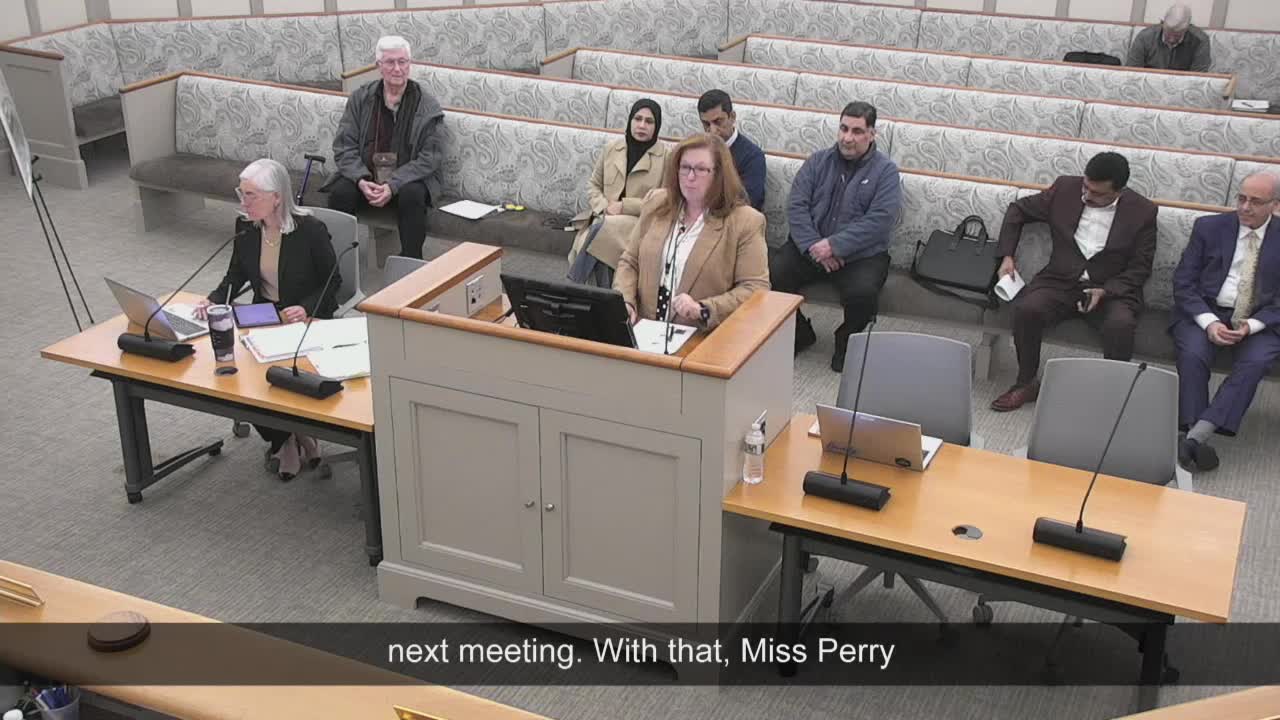Leesburg planning commission backs town‑plan amendment for Harvest Estates, forwards recommendation to council
Get AI-powered insights, summaries, and transcripts
Subscribe
Summary
The Leesburg Planning Commission voted Nov. 6 to forward a recommendation of approval to the Town Council for the Harvest Estates town‑plan amendment (TLTPAM20250001), asking staff to retain a 40‑foot vegetated buffer and to require preserved or replacement planting in the buffer; the commission’s action is a policy recommendation only and does not change existing zoning.
The Leesburg Planning Commission voted Nov. 6 to forward a recommendation of approval to the Town Council for Town Plan Amendment TLTPAM20250001, a proposed change to Legacy Leesburg policy for two parcels on Sicklin Road (collectively 14.4 acres) known as Harvest Estates.
Debbie Perry, a land use planner in the Department of Community Development, told the commission the amendment revises the “other parcels for special consideration” language for the Sicklin Road property to allow a mixed‑use vision with residential and small‑scale nonresidential uses, while adding provisions intended to increase compatibility with the adjoining Beauregard Estates neighborhood. The proposed policy includes a minimum 40‑foot vegetated buffer adjacent to Beauregard Estates, direction to locate taller and commercial buildings closer to Sicklin Road, guidance to protect steep slopes and streams, and phasing guidance that encourages commercial construction before or concurrent with residential development.
“Staff supports this application because the town plan amendment addresses the zoning ordinance criteria to justify the amendment,” Perry said, noting the amendment retains opportunities for commercial uses and includes additional language on environmental protection and context‑sensitive design.
The applicant team said the amendment is intended to create a predictable policy framework that would allow the owner to submit a future rezoning and site plans. Sapar Sheikh, identifying himself as owner of Harvest Estates/Harvest Group of Companies, praised staff coordination and said the company’s intent is a neighborhood‑first approach and to follow the policy guidance.
During the public‑comment period, three nearby residents who live on Fortress Circle raised concerns about construction‑period noise, dust and diesel emissions, nighttime light, and traffic safety from increased construction truck traffic. Speakers asked for stronger protections against stormwater contamination and fuel spills, better buffering and tree preservation, higher or evergreen screening plantings (rather than allowing existing invasive or dead vegetation), preservation of privacy from taller buildings, and assurances about slope stability and long‑term liability for hillside grading. One speaker asked that the town require professional archaeological testing before ground disturbance because the area historically hosted Civil War fortifications and could contain unmarked graves; staff confirmed that a Phase I archaeological survey meeting Virginia Department of Historic Resources (VDHR) standards would be required at rezoning and that Phase II procedures apply if burials or artifacts are found.
Commission discussion focused on whether policy wording should be advisory or more prescriptive (the draft uses “should” in several places), the 40‑foot buffer, and how town plan language relates to future zoning and DCSM (Design & Construction Standards Manual) engineering review. Staff clarified that the town plan amendment is a policy statement only and does not change underlying zoning: the southern parcel is currently zoned R‑1 (one single‑family dwelling per acre by right) and the northern parcel is zoned O‑1 with an existing 1986 rezoning/concept approval allowing about 67,500 square feet of office/personal service uses. Staff and several commissioners said the town plan language gives a clearer vision against which future rezoning would be evaluated; regulatory “teeth” for things such as specific planting sizes and exact setbacks would be implemented at rezoning or in the zoning ordinance/DCSM as required.
Commissioners debated buffer depth: staff explained the 40‑foot minimum was selected to roughly double the existing backyard distance from homes to the property line and to preserve or require new plantings where existing trees are not retained. Some commissioners proposed stronger buffering in areas with steep slopes; the commission ultimately directed staff to retain a 40‑foot minimum buffer in the policy and to add language that the buffer area must include preserved or planted trees (existing trees should be preserved where feasible; replacement landscaping is expected where trees are removed), and to evaluate increased buffer widths at the rezoning stage.
On a motion to forward TLTPAM20250001 to town council with a recommendation of approval based on the staff findings in the Nov. 6, 2025 staff report and as amended through the public hearing, the commission voted in favor. The record reflects the commission’s action was a recommendation on the town plan amendment only; any future rezoning, grading, stormwater and archaeological review will proceed through separate public hearings and technical review processes.
Planning staff emphasized that the action does not authorize construction, change the current zoning designations, or approve any site plans. Any development proposals will require separate rezoning and site‑plan approvals and additional technical studies (stormwater/drainage, slope stability, archaeological Phase I/II as applicable, and grading/stormwater controls subject to DCSM and engineering review).
Next steps: the amendment and the commission’s recommendation will be transmitted to the Leesburg Town Council for legislative consideration. A rezoning application and public hearing would follow if and when the applicant files a development application that relies on the amended town plan language.
